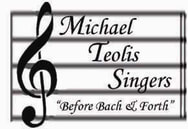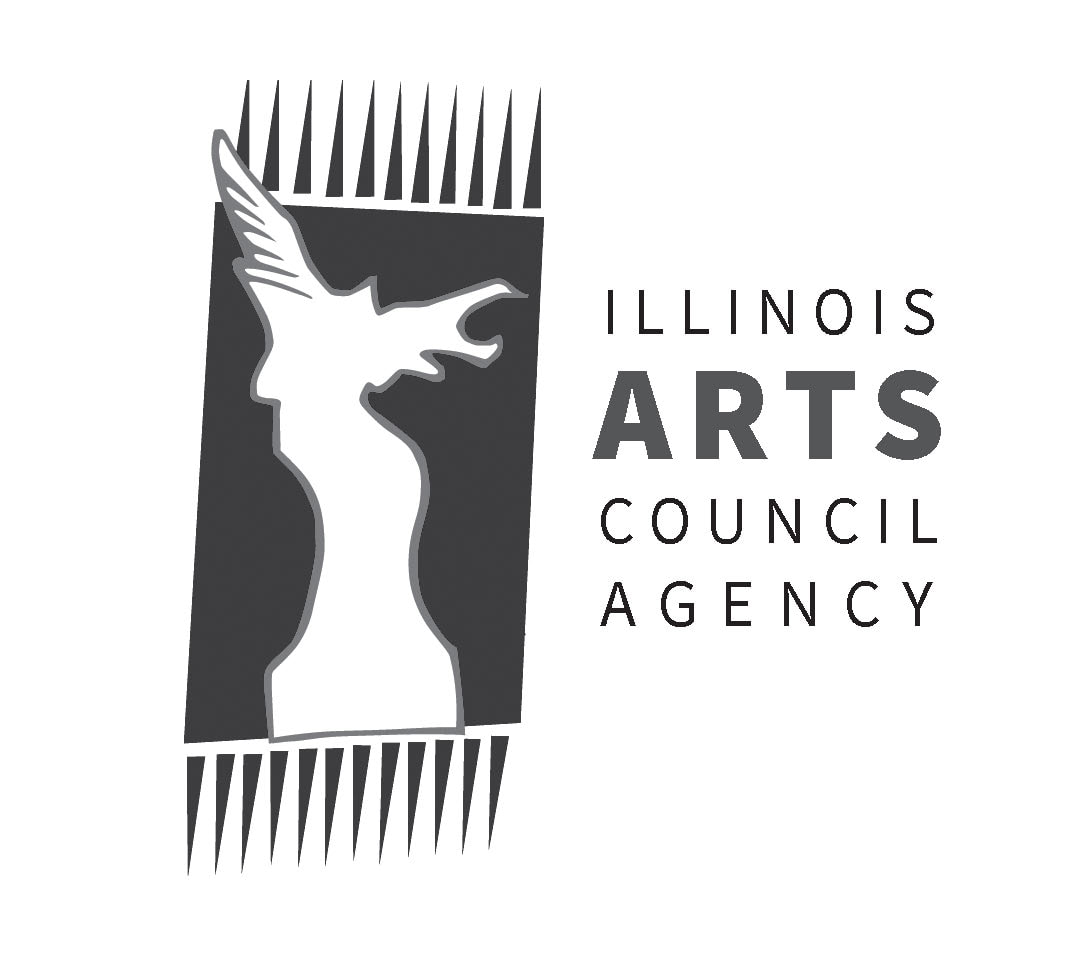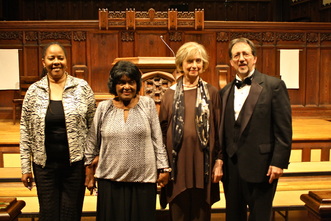 Regina Harris Baiocchi, Lena McLin, Lita Grier, and Michael Teolis Regina Harris Baiocchi, Lena McLin, Lita Grier, and Michael Teolis Wow, what a concert! The evening was truly historic. We presented the choral music of 17 women composers. We were fortunate and most grateful to have present as our guests some composers whose works we performed: Lita Grier, Lena McLin, and Regina Harris Baiocchi. 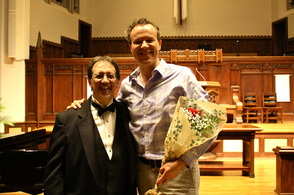 Michael Teolis and Aaron Gandy Michael Teolis and Aaron Gandy We were also thrilled to have as our guest, Mr. Aaron Gandy, who is the Artistic Advisor for the Kay Swift Memorial Trust and who flew in specially to join us for the concert. Our performance of “God Is Our Refuge,” which was written by Kay Swift, was the world premiere. We feel honored to have been given the opportunity by Katharine Weber and Mr. Gandy to introduce the work. The program included a variety of sounds and styles that demonstrated the versatility and range of our organization. What a wonderful end to an amazing season that included magnificent performances of more uncovered gems, more world premieres, and rediscoveries of some remarkable composers. There is more to come as we plan for our astonishing 10th season. Our next concert, Saturday, May 7th, will be a special experience. It features the music of 17 women composers from the United States. Each composer in our program has had an effect on musical life in America, music education, and on other prominent composers – male and female.
This music is touching, beautiful, and well crafted. This concert is for everyone. Our selections are sure to educate and open your eyes and ears. Contemporary composers include Lita Grier, Regina Harris Baiocchi, Gwyneth Walker, Diane Bish, and Lena McLin. We will also honor women from the past: Dana Suesse, Kay Swift, Marion Bauer, and Katherine K. Davis, among others. You’ll hear music from composers who are connected to other famous names in the history of music, including George Gershwin, Aaron Copland, and Nadia Boulanger. Come join us as we reveal our feminine side on Saturday, May 7th at 7:30 PM at the first United Methodist Church of Oak Park. View ticket information. This event should not be missed! The Michael Teolis Singers is pleased to present an hour-long recital at the historic Pleasant Home, 217 Home Avenue, Oak Park , on February 28th at 4pm. (Click here for ticket information.)
Over the years, wonderful and familiar tunes have been set chorally by talented arrangers; some of them very well known to the musical world. Among those composers are Samuel Barber, Sir David Willcocks, Aaron Copland, W.C. Handy, and Duke Ellington. Among others, featured selections will include a collaboration between Ira Gershwin and Aaron Copland – “Younger Generation”; Samuel Barber’s own choral version of his “Sure on This Shining Night”; the legendary W.C. Handy’s arrangement for double chorus of James P Johnson’s “Aintcha Got Music”; and Alice Parker’s arrangement of Duke Ellington’s “Come Sunday.” We always like to uncover hidden vocal gems too, so expect a unique offering from Sir David Willcocks’ “You Bring Me Happiness.” Willcocks is better known as a composer and conductor of serious compositions and his work at King’s College Cambridge; however, he wrote this song while serving for the British Army during World War II. It is quite a different statement by such a highly-revered musician, as it was written in a rather English-music hall vein. Rounding out the program will be Clay Warnick’s brilliant medley arrangement of Gershwin’s “Porgy and Bess.” To audiences familiar with our ensemble, this is a wonderful opportunity to experience reprises of your favorite pieces from some of our past concerts. For those who have yet to discover the Michael Teolis Singers, this might be the perfect occasion to be introduced to a truly special voice in Chicagoland’s music scene. Music for musicians? Or music for the masses? Programming concerts for this time of year can present special challenges for yours truly.
It’s a perennial challenge creating a pleasing balance of newer and more familiar works — but a challenge I welcome and truly enjoy. Ring in both new and familiar Dec 5th and 13th. Both upcoming concerts will feature a blend of hidden gems you may have missed, and old familiar musical friends you can’t get enough of, and more. Our opening works will set the evening’s glitzy “Holiday Table.” We will begin the concert with “A Joyous Noel” by Gordon Young and “Hodie Christus Natus Est” by Healy Willan. Prolific church musicians of exceptional organ playing abilities created both works. Every family seems to have a seasonal ritual — maybe because we find these traditions so comforting, reassuring and familiar. In keeping with the true “reason for the season,” I always try to incorporate an “Ave Maria.” Carl Czerny was a student of Beethoven and I think you can hear a little of the Master’s sounds in this musical prayer. The “Alma Redemptoris Mater” of Marcel Duprè is next. It started out as a portion of a larger work for organ, while “Joys Seven” is an English carol arranged by Steve Cleobury, music director at King’s College. Have you heard the “Bird’s Noel?” Most people know the composer, Katherine K. Davis, better than they think. For all of the music Ms. Davis wrote in her lifetime, she is best remembered for “The Carol of the Drum,” aka “The Little Drummer Boy.” Afterwards, one might just feel inspired to look into the prolific output of cantatas, piano and organ works, and seven operas of Katherine K. Davis. Be ready to experience the amazing “Cum Novo Cantico” of Gerald Near. This piece is full of familiar Christmas tunes and chants, all treated with a variety of variations, and with a virtuosic accompaniment. After a brief intermission… the entire second half of our performance is made up of arrangements of familiar tunes. You’ll hear “Fum, Fum, Fum,” “Pat-A-Pan,” “Rockin’ Jerusalem,” and “The Virgin Mary Had a Baby Boy.” Closing the concert is Vaughan Williams’ “Fantasia on Christmas Carols.” His arrangement features familiar English Christmas Carols, which he envelopes in lush orchestrations. We will be performing the piece with strings, organ and percussion. Warm up your vocal chords! As you can see, our program offers something for everyone. We even give the audience a chance to sing, as we close the concert with a reprise from last year’s concert: “We Wish You a Merry Christmas.” Just as you love to experience both the familiar and the new, I look forward to seeing our faithful MTS fans and generous patrons, as well as newcomers. So… Bring a friend to one of our performances soon — December 5th or December 13th. Give the gift of holiday music. What a wonderful way to get into the spirit of the season! We are heading into our final preparations for the December 5th program.
For Christmas, I always try to find material that is familiar to all audiences, but I also like to uncover those hidden gems that are accessible, fun to hear, and could or should be part of the mainstream repertoire. Expect both at our concert on December 5th. Here are some of the selections we’ll be performing: Gerald Near’s Cum Novo Cantico for organ and chorus. This piece is in three movements and uses popular carol tunes and Gregorian Chants of the season as its structure. The organ part is virtuosic, but still compliments the chorus, which, on occasion will perform the tunes a cappella and in different permutations. “Bird’s Noel” by Katherine K. Davis. Davis is best remembered for her composition “The Carol of the Drum,” commonly referred to as “The Little Drummer Boy.” A couple of seasons ago, we performed her Christmas cantata This is Noel, which featured the Lyons family Kim, tenor; Susie, soprano; and their daughter Abby on oboe. You’ll hear familiar carols too. Like the Shaw/Parker “Fum Fum, Fum,” Kinsman’s “Pat-A-Pan,” Mack Wilberg’s “The Virgin Mary had a Baby Boy,” and a Christmas spiritual, “Rockin’ Jerusalem,” by John W. Work III. A few other fun selections will round out the program. There might even be a chance for the audience to join in at one point. What a great way to get in the spirit of the season! I look forward to seeing you there. Thank you to all who supported the Michael Teolis Singers during our 8th season! Our extraordinary musical year included amazing literature, highlighted talented young composers and featured the music of many familiar artists.
We broke new ground with “A Musical Fusion: Africa and the West,” our spring concert featuring the music of black composers of the Western hemisphere. Among the seldom-heard gems were a chorus from the opera “Treemonisha,” by Scott Joplin; a choral setting of Duke Ellington’s “Come Sunday”; a setting of “The 23rd Psalm” by Bobby McFerrin, and a rousing performance of “All the Earth Sing Unto the Lord,” by Chicago’s very own, Lena McLin. The concert closed with chorus, organ, brass, and percussion performing Adolphus Hailstork’s joyous “Break Forth.” This one-of-a-kind concert was presented with the assistance Columbia College’s Center for Black Music Research.
For the full concert listings, including the past season, view the programs here. We happily welcome and extend our appreciation to our new friends, and we promise more fun and exciting programming ahead. Next year will include just as much fun and as many surprises, if not more. Watch for special announcements regarding our amazing 9th season. You won’t want to miss a note! The first half of this concert will be music of Haiti, Columbia, Brazil, Guadeloupe, Cuba, Canada, and Jamaica.
As I’ve mentioned, I looked for music written by black composers of the Western Hemisphere who wrote using western forms and styles, but who also infused elements of their particular cultures. I looked for composers who incorporated rhythms, language, and instruments. Each of the composers in our first half was celebrated and/or at least significantly recognized in his lifetime. Some of the music I found by composers from the Caribbean incorporated similar rhythms and energy, so, for programming’s sake, I chose to limit what would represent that style of music from that area of the hemisphere. Initially, I was looking for pieces such as cantatas, masses, pieces making use of traditional sacred texts; thinking in terms of Afro-Classical, rather than just looking for popular songs or folk song arrangements. Some of the pieces I found through online searches. Some things I found with the help of my friends at the Center for Black Music Research (CBMR) at Columbia College. I feel badly that I could not include all of the composers that I wanted. Ultimately, it came down to style, geographic location, accessibility (could I get my hands on the piece), level of musical challenge, and preparation time available. Our opening selection, “Twa Tanbou,” composer Sydney Guillaume mentions as being his most popular work. It has been performed by professional, school, and community organizations. The text comes down through his family and he set it at the suggestion of his mother. It’s lively, full of energy, and was probably one of our greatest challenges. Although some of the sounds we make imitate drums, we are singing mostly in Haitian Creole. I recently learned that the “Arrurru” by Alfredo Mejia Navarro we are singing was never published. I’m thinking this should be a US premiere. Arrurru is a lullaby, very straightforward in style and mostly homophonic. Getting the piece involved going through CBMR to the University of Indiana, to an archive in Columbia. The “Chantons Célébrons Notre Dame” from the opera L’Amant Anonyme by Joseph Bologne Chevalier de Saint-Georges was a fascinating find – an opera written by a black Guadeloupian/French composer. He was quite the soldier and fencing master, which makes me wonder when he had time to write music, practice the violin, and conduct. I learned that The Little Opera Theatre of New York is developing a project that will eventually involve a full presentation of the opera, and has already presented some excerpts. Early on, I discovered Nuñes-Garcia’s Requiem, from which we will be doing the opening “Requiem” movement. Here was a person born in Brazil, who was a grandson of slaves, was highly educated, studied music seriously, eventually became a priest, (and married and had children, as was usual in Brazilian society), traveled, and wrote much music. His Requiem reflects the period and the musical influences he was exposed to in his lifetime. The piece we are presenting by Cuban composer, Electo Silva, is rather nationalistic in character. It is his arrangement of a song by Pedro Gómez Rodríguez and comes from a collection of song arrangements Silva published in the mid-1990s. It is very dance-like in style, reflecting one of the musical styles popular in Cuba. We are reprising R. Nathanial Dett’s “Ave Maria.” Dett was Canadian-born but spent much of his creative and formative musical life in the United States. The piece exhibits hints of some of the characteristics of the folk songs and spirituals he often incorporated into his compositions. The piece closing the first half is by Jamaican composer, Andrew Marshall called “Mieri Sang.” The text comes from the Jamaican bible but is based on the verses of the Magnificat. It’s a lively celebration accompanied by piano and congas. Although there are a lot of separate pieces on this program, none is overly long. I like to think there is a wonderful variety that will keep the attention of the audience from piece to piece throughout the concert. Planning this concert has been a unique challenge.
At first, I thought of including black composers from all over the world. As it turned out, I had too much material. I found some great music written by some very skilled composers. I figured I had to trim the scope of the program and wound up focusing on the composers only of the western hemisphere. I discovered several talented composers who were native to the Caribbean, Central America, South America, and Canada. I also found that most of them were trained in somewhat of a classical tradition – learning to write in traditional forms, learning traditional harmony, and working with traditional western instruments. I thought it would be relatively easy to obtain the music; however, it was not to be. The staff at the Center for Black Music Research of Columbia College has been most helpful, especially when researching composers, their music, and making contacts outside of the country. The Internet has been my main tool when contacting composers, archives, and other sources to obtain some of the hard-to-get material. There is a plethora of spirituals and gospel arrangements available. I found that most US Afro-Classical composers such as Margaret Bonds, William Grant Still, and Adolphus Hailstork wrote arrangements of spirituals. Some of the elements of those songs can be heard in their larger, legitimate works. Besides those wonderful arrangements and tunes, I wanted to find other pieces that might make use of western styles and forms, such as masses, cantatas, operas, or madrigals. This concert will feature some spirituals and a gospel arrangement and possibly some Ellington – who considered himself more than simply a composer of jazz compositions. Imagine a Magnificat set to Jamaican Patois text; or a portion of an opera written in ragtime; or a psalm written by a contemporary pop artist. It will happen on May 2 in Oak Park. Through some friends, in 1999, I happened to meet the eminent British conductor/composer, Sir David Willcocks. Then almost 80, he took me and a friend on a brisk walking tour of King’s College, Cambridge University, that left us scrambling to keep up — all the while telling anecdotes of his time as a student, teacher, and Director of Music at King’s College.
During a return visit in 2010, I was able to visit him once again at his home in Cambridge. Although that visit was short, we spent a good portion of it talking music. After giving me an impromptu lesson on the execution of phrasing in psalmody, he showed me a proof of a piece he submitted to Oxford University Press, his publisher. The song was “You Bring Me Happiness.” He sat down at the piano, played through it, and explained that it was one of a few songs he wrote as a soldier during Word War II. The song, arranged for piano and SATB chorus, evokes tenderness in a “jazzy style,” and is reminiscent of something from a British music hall, complete with a big piano glissando at the end. He also wrote the words — although, while I was there, he kept trying to attribute them to his daughter Anne, who was also there and kept insisting he wrote them all. At one point, while showing me the proofs, he mentioned that he has a reciprocal arrangement with his friend John Rutter: Rutter would check his proofs and David would check Rutter’s. With the support of David’s family, particularly from his son Jonathan, also a composer of note, we are happy to premier his song in the United States. This song shows another side of this legendary musician. When searching for composers we know, who wrote music that might surprise us, John Philip Sousa was one of the first names I thought might have something interesting for our spring concert. Thankfully, he did not disappoint, and thank God for the Internet! What used to take me weeks, with the help of libraries, librarians, and telephones, came together in a matter of hours: a fairly definitive list of Sousa’s works, going back to his early years.
It turns out that long before “Stars and Stripes Forever,” long before The Sousa Band and its 15,000 concert performances, the “American March King” tried his hand at sacred music. The “Te Deum in B-flat” was written in 1874, when Sousa was only 20 years old, the same year he was discharged from the Marine Band. It is scored for SATB chorus, organ, and soloists. There isn’t a great deal written about it, but given the text, I imagine it was intended for a church service or some sacred event. At times, the piece reminds me of a series of exercises in traditional harmony. The tunes are strong and the progressions are inevitable, for the most part. In my mind, there is not a lot of foreshadowing in the music of his great career that followed, but there are some unmistakable sounds of the Victorian era. Sousa probably wrote it at a time when he was playing violin in theatre orchestras. He did a great deal of work in musical theatre and, he wrote about 250 songs and fifteen operettas during his career, hence his experience with writing for voices. The last performance of the “Te Deum” I found was at Grace Evangelical Lutheran Church in Camp Hill, Pennsylvania in 2006, under the direction of music director, Fred Hooper. Our performance will be the Midwest premier. |
Michael TeolisReflections on concerts, composers and music... Archives
February 2024
|
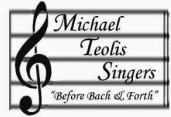
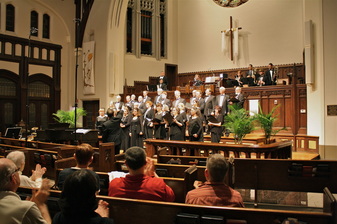
 RSS Feed
RSS Feed
